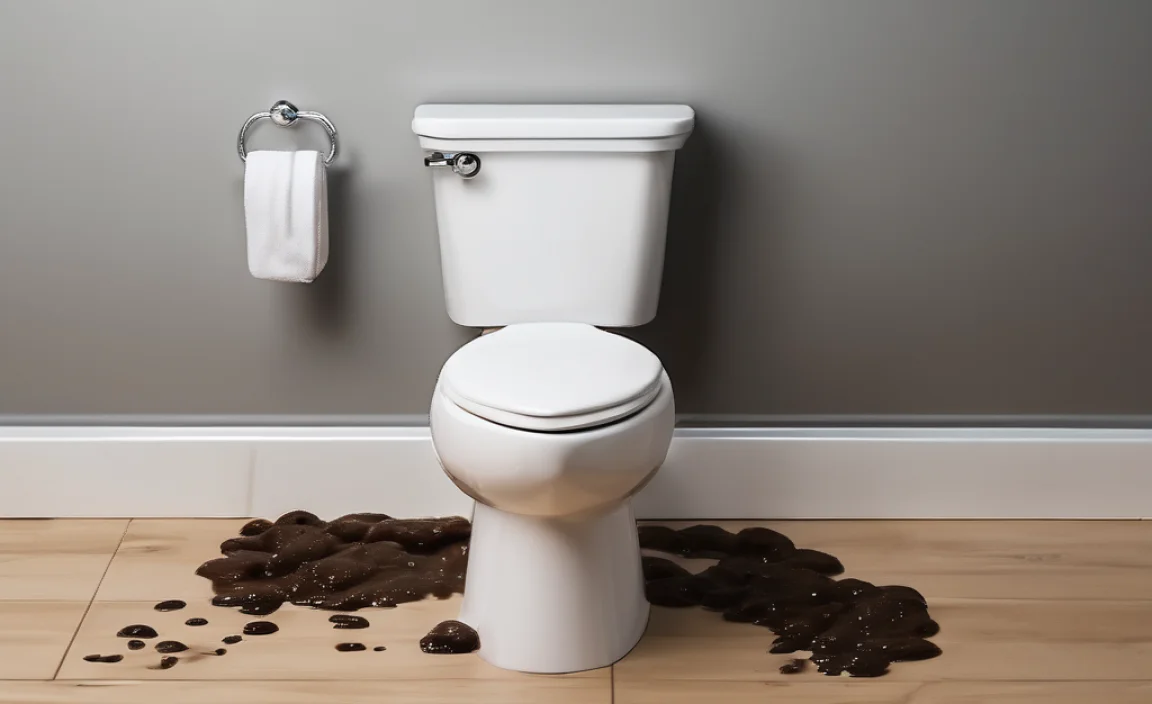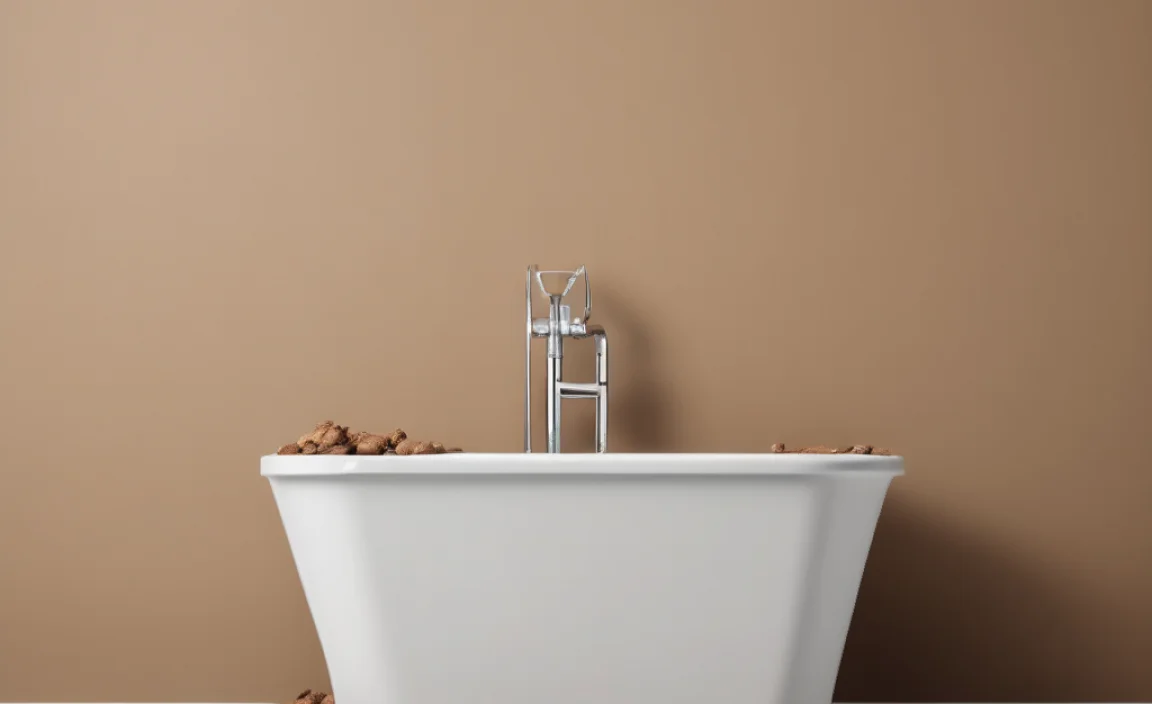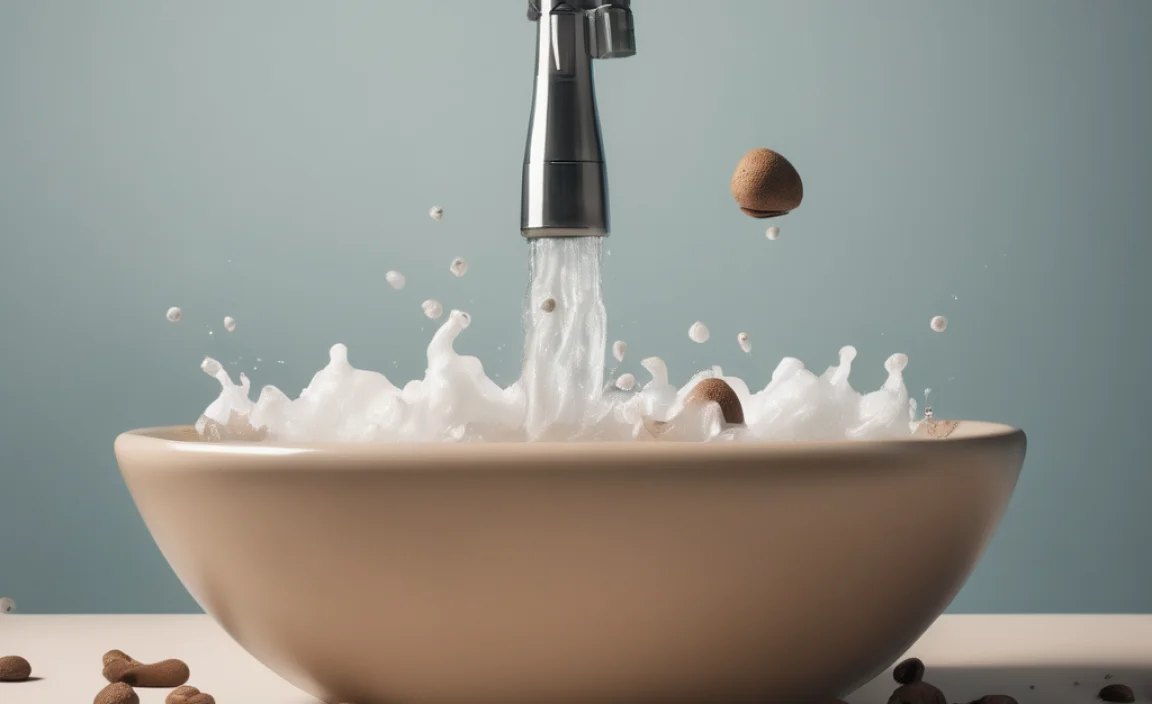Generally, healthy poop should sink. Floating poop can happen occasionally due to changes in diet or a temporary increase in gas. However, if your stool consistently floats, it could indicate a problem with fat absorption, which may warrant a visit to your doctor.
Have you ever wondered if your poop should float or sink? It’s a common question, and honestly, it can be a bit puzzling! Most of us don’t spend a lot of time thinking about it, but the truth is, what happens in the toilet can tell you a lot about your health. Is it something you should worry about? Don’t sweat it; we’re going to break it down step-by-step.
We’ll explore what makes poop float or sink, what’s considered normal, and when you might want to chat with your doctor. By the end of this article, you’ll have a much clearer idea of what your poop is trying to tell you. Let’s dive in!
Understanding the Basics: What Makes Poop Float or Sink?

So, what really determines whether your poop decides to take a dive or stay afloat? It all boils down to a few key factors. Let’s take a closer look.
Fat Content
One of the biggest reasons poop floats is the amount of fat it contains. Normally, your body absorbs fats from the food you eat in the small intestine. If your body isn’t absorbing fat properly, that extra fat ends up in your stool, making it less dense than water. Think of it like oil in water – it just floats right on top.
Gas
Gas is another common reason for floating stools. We all have gas in our digestive system – it’s a natural part of the digestion process. However, if you have a lot of gas-producing bacteria in your gut, or if you’re eating foods that create a lot of gas (beans, anyone?), your poop can become buoyant. The gas bubbles get trapped inside, turning your stool into a little raft.
Density
Density plays a big role, too. Healthy poop is usually fairly dense because it’s made up of water, fiber, bacteria, and other digestive byproducts. When the balance of these components is off – say, you have too much undigested food or not enough fiber – it can change the density and affect whether it floats or sinks.
What’s Considered Normal? Floating vs. Sinking Stool

Now that you know what influences poop’s buoyancy, let’s talk about what’s considered normal. Should you be worried if your poop occasionally floats? Not necessarily! Here’s a quick guide:
- Sinking Stool: This is generally a sign of healthy digestion. It means your body is absorbing nutrients properly, and your stool has a good balance of water, fiber, and other solids.
- Occasionally Floating Stool: Don’t panic! A floating stool every now and then is usually nothing to worry about. It could be due to something you ate, a temporary increase in gas, or a slight change in your diet.
- Consistently Floating Stool: If your stool is consistently floating, especially if it’s also greasy or foul-smelling, it might be a sign of a problem. This could indicate that your body isn’t absorbing fats properly, which could be related to a medical condition.
Think of it this way: occasional floating is like a hiccup – annoying, but usually harmless. Consistent floating is more like a persistent cough – it might be a sign that something else is going on.
Possible Causes of Floating Stool

If you’re experiencing floating stool more often than not, it’s worth considering the possible causes. Here are some of the common culprits:
Dietary Factors
What you eat can have a big impact on your poop. High-fat diets, for example, can overload your digestive system and lead to increased fat in your stool. Similarly, foods that produce a lot of gas, like beans, cabbage, and carbonated drinks, can make your poop float. Even artificial sweeteners can sometimes cause digestive upset and lead to floating stools.
Malabsorption
Malabsorption is a condition where your body isn’t able to absorb nutrients properly. This can be due to a number of factors, including:
- Celiac Disease: An autoimmune disorder triggered by gluten, which damages the small intestine and impairs nutrient absorption.
- Pancreatic Insufficiency: A condition where the pancreas doesn’t produce enough enzymes to digest fats, proteins, and carbohydrates.
- Lactose Intolerance: Difficulty digesting lactose, a sugar found in dairy products, which can lead to gas and bloating.
- Short Bowel Syndrome: Occurs when a portion of the small intestine is removed, reducing the surface area available for nutrient absorption.
Infections
Certain infections can also cause floating stool. Giardiasis, for example, is an intestinal infection caused by a parasite called Giardia. This infection can interfere with fat absorption, leading to floating, greasy stools.
Other Medical Conditions
In some cases, floating stool can be a symptom of other underlying medical conditions, such as:
- Cystic Fibrosis: A genetic disorder that affects the lungs and digestive system, leading to problems with nutrient absorption.
- Irritable Bowel Syndrome (IBS): A common disorder that affects the large intestine, causing symptoms like abdominal pain, bloating, and changes in bowel habits.
When to See a Doctor
So, when should you be concerned about floating stool? Here are some signs that it’s time to see a doctor:
- Persistent Floating Stool: If your stool is consistently floating for more than a couple of weeks, it’s a good idea to get it checked out.
- Greasy or Foul-Smelling Stool: This can be a sign of fat malabsorption, which could indicate a more serious problem.
- Other Symptoms: If you’re experiencing other symptoms like abdominal pain, bloating, weight loss, or diarrhea along with floating stool, it’s important to seek medical attention.
- Changes in Bowel Habits: Any significant changes in your bowel habits, such as increased frequency, urgency, or changes in stool consistency, should be discussed with your doctor.
Don’t be embarrassed to talk to your doctor about your poop! They’ve heard it all before, and they can help you figure out what’s going on and get you the treatment you need.
How to Improve Your Stool Health
Whether your poop is floating or sinking, there are things you can do to improve your overall stool health. Here are some tips:
Dietary Changes
- Increase Fiber Intake: Fiber adds bulk to your stool and helps it pass through your digestive system more easily. Good sources of fiber include fruits, vegetables, whole grains, and legumes.
- Reduce Fat Intake: If you’re eating a lot of fatty foods, try cutting back to see if it makes a difference. Focus on lean proteins, healthy fats, and plenty of fruits and vegetables.
- Limit Gas-Producing Foods: If you’re prone to gas, try avoiding foods like beans, cabbage, broccoli, and carbonated drinks.
- Stay Hydrated: Drinking plenty of water helps keep your stool soft and prevents constipation. Aim for at least eight glasses of water a day.
Lifestyle Adjustments
- Exercise Regularly: Physical activity helps stimulate your digestive system and keeps things moving along.
- Manage Stress: Stress can wreak havoc on your digestive system. Try relaxation techniques like yoga, meditation, or deep breathing exercises to manage stress.
- Probiotics: Probiotics are beneficial bacteria that can help improve your gut health. You can get probiotics from foods like yogurt, kefir, and sauerkraut, or from supplements.
Over-the-Counter Remedies
In some cases, over-the-counter remedies can help improve your stool health. For example, fiber supplements like psyllium husk or methylcellulose can help add bulk to your stool and prevent constipation. Digestive enzymes can also help break down food and improve nutrient absorption.
| Remedy | How it Helps | Things to Consider |
|---|---|---|
| Fiber Supplements | Adds bulk to stool, prevents constipation. | Start with a low dose and increase gradually. Drink plenty of water. |
| Digestive Enzymes | Breaks down food, improves nutrient absorption. | Take with meals. Consult your doctor if you have any underlying medical conditions. |
| Probiotics | Balances gut bacteria, improves digestion. | Choose a reputable brand. May cause mild gas or bloating initially. |
A Deeper Dive: Medical Tests and Diagnosis
If your doctor suspects that your floating stool is due to an underlying medical condition, they may recommend some tests to help with diagnosis. Here are some common tests they might use:
Stool Tests
Stool tests are used to analyze your stool for various factors, such as fat content, bacteria, parasites, and other abnormalities. A fecal fat test, for example, measures the amount of fat in your stool, which can help determine if you’re absorbing fats properly. Stool cultures can identify any harmful bacteria or parasites that might be causing digestive problems.
Blood Tests
Blood tests can provide valuable information about your overall health and can help identify potential causes of floating stool. For example, blood tests can check for celiac disease, pancreatic insufficiency, and other medical conditions that can affect digestion.
Imaging Tests
In some cases, your doctor may recommend imaging tests to get a better look at your digestive system. An abdominal X-ray can help identify any structural abnormalities, while a CT scan or MRI can provide more detailed images of your organs. An ultrasound can also be used to examine the liver, gallbladder, and pancreas.
Endoscopy
Endoscopy involves inserting a thin, flexible tube with a camera attached into your digestive tract to visualize the lining of your organs. A colonoscopy is used to examine the colon, while an upper endoscopy is used to examine the esophagus, stomach, and duodenum. Endoscopy can help identify inflammation, ulcers, tumors, and other abnormalities.
Preventative Measures for Healthy Stool
Prevention is always better than cure. Here are some preventative measures you can take to maintain healthy stool and avoid digestive problems:
- Maintain a Balanced Diet: Focus on eating a variety of nutrient-rich foods, including fruits, vegetables, whole grains, lean proteins, and healthy fats.
- Practice Good Hygiene: Wash your hands thoroughly with soap and water, especially before eating and after using the toilet, to prevent infections.
- Cook Food Properly: Cook food to the proper temperature to kill harmful bacteria and parasites.
- Avoid Overeating: Eating too much food at once can overwhelm your digestive system and lead to digestive problems.
- Limit Alcohol and Caffeine: Alcohol and caffeine can irritate your digestive system and worsen digestive symptoms.
- Quit Smoking: Smoking can damage your digestive system and increase your risk of digestive disorders.
- Regular Check-ups: Regular check-ups with your doctor can help identify and treat any underlying medical conditions that might be affecting your stool health.
The Role of Fiber: A Closer Look
Fiber is a superstar when it comes to stool health. It’s the indigestible part of plant-based foods that adds bulk to your stool, helps it pass through your digestive system more easily, and promotes regular bowel movements. There are two types of fiber: soluble and insoluble.
- Soluble Fiber: Dissolves in water to form a gel-like substance, which helps lower cholesterol and regulate blood sugar levels. Good sources of soluble fiber include oats, beans, apples, and citrus fruits.
- Insoluble Fiber: Doesn’t dissolve in water and adds bulk to your stool, which helps prevent constipation. Good sources of insoluble fiber include whole grains, vegetables, and nuts.
Most plant-based foods contain a combination of both soluble and insoluble fiber, so it’s important to eat a variety of fiber-rich foods to get the full benefits. Aim for at least 25-30 grams of fiber per day to promote healthy stool and prevent digestive problems. According to Mayo Clinic, most Americans only get about half that amount.
Beyond the Float: Other Stool Characteristics to Monitor
While whether your poop floats or sinks is important, it’s not the only thing to pay attention to. Here are some other stool characteristics to monitor:
- Color: Healthy stool is usually brown. Changes in color can indicate various health problems. For example, black stool can indicate bleeding in the upper digestive tract, while red stool can indicate bleeding in the lower digestive tract.
- Consistency: Healthy stool should be soft and formed. Hard, pebble-like stool can indicate constipation, while loose, watery stool can indicate diarrhea.
- Odor: Stool naturally has an odor, but excessively foul-smelling stool can indicate an infection or malabsorption.
- Shape: Healthy stool is usually long and cylindrical. Changes in shape, such as narrow or ribbon-like stool, can indicate a blockage in the colon.
- Frequency: Normal bowel movement frequency varies from person to person. Some people have bowel movements several times a day, while others have them only a few times a week.
If you notice any significant changes in your stool characteristics, it’s important to talk to your doctor. They can help you figure out what’s going on and get you the treatment you need.
FAQ About Floating Poop
Here are some frequently asked questions about floating poop:
1. Is it always bad if my poop floats?
No, not always! Occasional floating poop is usually nothing to worry about. It’s often due to changes in diet or a temporary increase in gas.
2. What foods can cause floating poop?
High-fat foods and gas-producing foods like beans, cabbage, and carbonated drinks can cause floating poop.
3. When should I see a doctor about floating poop?
See a doctor if your poop is consistently floating, especially if it’s also greasy or foul-smelling, or if you have other symptoms like abdominal pain or weight loss.
4. Can stress cause floating poop?
Yes, stress can affect your digestive system and potentially lead to changes in your stool, including floating poop.
5. How can I improve my stool health?
Increase your fiber intake, reduce your fat intake, stay hydrated, exercise regularly, and manage stress to improve your stool health.
6. Is there a connection between floating poop and weight loss?
Unexplained weight loss along with consistently floating stool could indicate malabsorption issues and should be evaluated by a doctor.
7. Can certain medications cause floating poop?
Yes, some medications can interfere with nutrient absorption or affect gut bacteria, leading to floating stool. Check with your pharmacist or doctor about potential side effects of your medications.
Conclusion
So, should your poop float or sink? Ideally, it should sink, but occasional floating isn’t usually a cause for concern. Keep an eye on your diet, stay hydrated, and listen to your body. If you notice any persistent changes or other symptoms, don’t hesitate to reach out to your doctor. Taking care of your digestive health is a key part of overall well-being. Now you’re armed with the knowledge to keep things flowing smoothly!


